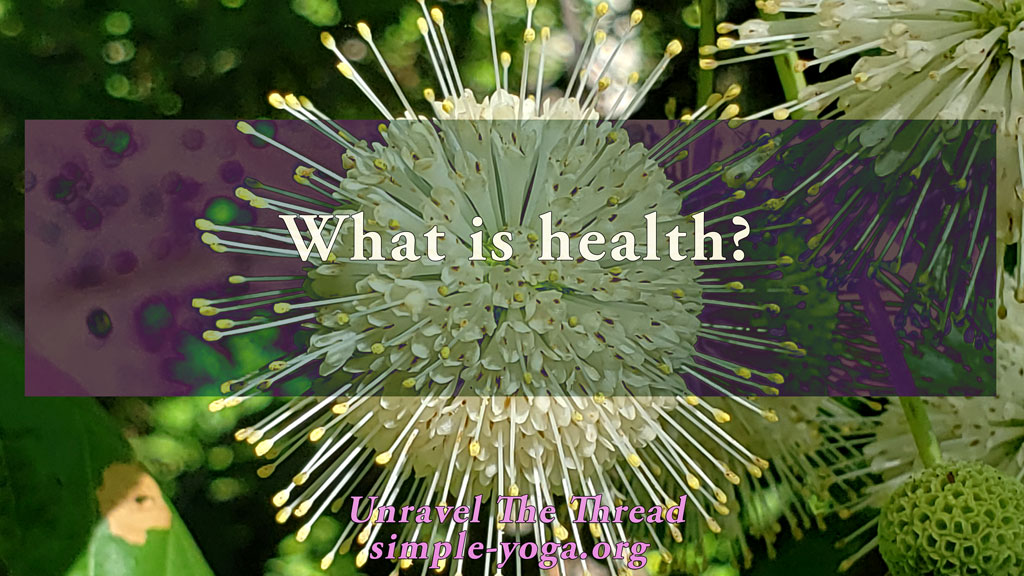
2nd retreat:Yoga in the Alps 2025!
August 27, 2024
Health, appetites and elimination (part 2)
September 14, 2024
2nd retreat:Yoga in the Alps 2025!
August 27, 2024
Health, appetites and elimination (part 2)
September 14, 2024What is health?

What is health?
This is the first in a short series of episodes related to a simple yet truly important concept, health and its relationships to yoga practice.
One of the goals of our approach to yoga, Simple Yoga, is to outline clear and practical ways to practice yoga, not only for our individual benefit, but for the benefit of our families, communities, and all beings. Let’s remember that according to The Yoga Sutras, the ultimate goal of yoga is to transcend our mind and remain in our true nature (1.3) of unclouded awareness, joyful gratitude, and compassion. In the first chapter of The Yoga Sutras, Patanjali speaks of nine obstacles to presence (1.30), the first of which is illness (vyadhi). This is not surprising. Even if it is the most beautiful day, you are in good company, and you are in a beautiful place, if you are not feeling well, it will be very difficult for you to take your mind off your illness and enjoy the moment you are in. Every culture probably has a saying or proverb that indicates that health is the greatest treasure and more valuable than anything else. In addition, when we feel ill or live with chronic pain, there is added worry and stress that may cause us to avoid activities that we fear will aggravate our current level of pain. Without health, peace of mind is certainly quite a challenge.
How do we define health? If we look up health in a dictionary such as the American Heritage Dictionary, we find definitions of health such as “a state of optimal well-being” and as “freedom from disease or abnormality. While the first definition is positive, the second definition presents the typical challenge of negative definitions. (As we mentioned in our discussion of the yamas and niyamas, negative definitions tell us what we can’t or shouldn’t do, but they don’t give us useful guidelines for action. For example, if we define the yama of asteya as not stealing, some people will have questions about specific details when trying to put asteya into practice, whereas defining asteya as fairness and generosity, in addition to including the original meaning of not stealing, may also suggest specific ways to put this yama into practice.)
The World Health Organization (WHO) offers a broad definition of health: “Health is a state of complete physical, mental and social well-being and not merely the absence of disease or infirmity. This definition provides a positive definition that integrates the physical, mental and social aspects of a person. It also identifies several relevant dimensions of well-being, including social, economic and environmental conditions. However, it seems that the concept of well-being is so broad that it doesn’t suggest specific ways to act. Let’s try to create a definition of health that encompasses the fact that health is much more than not feeling sick or having pain, while recognizing the complementary dimensions of our being that can be enhanced and supported through our yoga practice.
Health is the harmonious integration of adequate appetites, efficient elimination, optimal posture, graceful movement, cheerful attitude, calm mind and compassionate interaction.
We will begin by thinking about this definition from a global perspective. Then we will go through the different components of this definition of health and try to find connections to using Patanjali’s Eight Limbs of Yoga (Ashtanga Yoga) to support, nourish, and improve our health. As we dive into the definition, let’s remember the related ideas of Range of Action and Range of Awareness that we explored in previous episodes, as they can remind us to broaden our perspective and understanding.
Let’s begin by noting that this comprehensive definition of health attempts to broaden our awareness of health by including the physical, mental, emotional, and social dimensions of our being. In addition, the definition links these aspects of being by suggesting that they are all interconnected. The proposed definition of health offers us an all-encompassing understanding of a state of being that is related to Patanjali’s notion of abiding in one’s true nature (1.3). It can also be related to what some people call spiritual health, which in its simplest terms refers to knowing who we truly are. Let’s think of this abiding in our true nature as the result of having a deep understanding of our own being that is not limited to thoughts, but is embodied and leads us to recognize our profound interconnectedness with all of existence and guides our intentions, actions, and interactions in the world.
This comprehensive definition implicitly invites us to consider how we attend to the different aspects of our being. It also asks us to consider whether there is a harmonious integration of all aspects of our being. We can use the following questions to contemplate our health during the next week:
- How aware am I of my appetites?
- What is my awareness of my processes of elimination?
- Is my posture optimal?
- How are my movements?
- How would I describe my general attitude?
- Is my mind generally calm?
- How do I participate in my interactions?
- We may also explore, are all aspects of my being in balance?
- Another way of asking this question could be: Am I a person who “lives” more in my mind, my emotions, my body or my interactions? One simple approach to exploring this idea is to notice how much time we dedicate to physical activity, mental activity, emotional connection to ourselves and to others and to meaningful social interaction.
After paying attention to these aspects of you and your life, would you say that you are healthy? What do you find when you examine your daily activities through this definition of health?
In the next episode we will think about different aspects of the definition and their relation to yoga and yoga practices.
If you prefer, you may listen to the podcast:
This is an excerpt from the book Unravel the thread: Applying the ancient wisdom of yoga to live a happy life
If you find Simple-Yoga.org and Unravel the thread useful, consider supporting my labor with a donation, you may also donate using PayPal or Venmo. Thank you!
